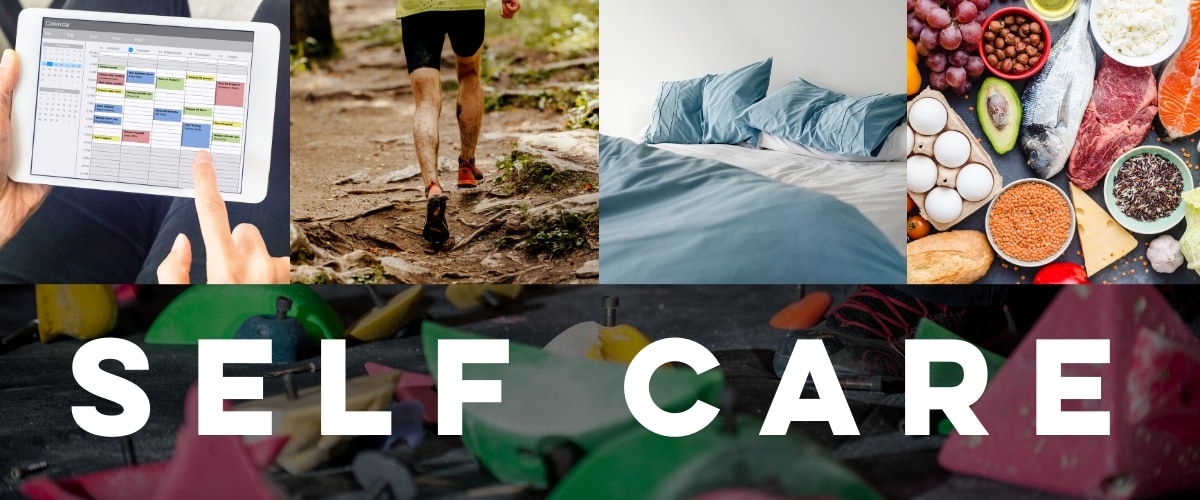Self-Care for Routesetters (and Anyone Experiencing Burnout)

Routesetters can work in many different scenarios – part or full time in a gym, setting for comps, freelancing for private clients, they can travel or stay in the same location or a combination of all those scenarios. The dynamic nature of the work can have routesetters juggling a lot – changing schedules, administrative duties, meetings, sorting out crew problems, and looking for work in addition to the physical labor of putting up new routes and stripping old ones.
Balancing the unique physical, creative, and administrative workload of routesetting creates prime conditions for burnout, which is on the rise generally. For more in-depth information on burnout culture, check out our previous post, Burnout Culture: Defining the Problem and Potential Solutions for Climbing Gyms.
According to the The World Health Organization (WHO), burnout is chronic workplace stress and has been attributed to ‘Workism’ by Psychology Today. Workism is the belief that “work is not only necessary to economic production but also the centerpiece of one’s identity and life’s purpose; and the belief that any policy to promote human welfare must always encourage more work.”
In other words, when work takes priority over other aspects of life such as family, friendships, health, and fitness, not only do those aspects of life suffer, so does your work, creativity, and productivity. It can be a self-defeating and unending cycle.
Why Addressing Burnout Is Important
What happens when you experience fatigue and burnout? When you are fatigued, it is harder to perform your job and can increase your risk of injury. When you experience burnout, any creativity and enjoyment you experience in your work can be elusive. Fatigue and burnout also affect all aspects of your life, not just your work.
Often it takes a wake-up call either in the form of injury or an event in our personal lives to make us realize the toll that a demanding schedule and intense physical labor can take on our bodies and lives, but you don’t have to wait until everything falls apart. You can implement self-care strategies easily into your everyday life and work schedule.
How do you know when you are burnt out? You might experience lethargy and lack of motivation or interest in your work. Making time to accomplish your job responsibilities can seem impossible.
While there will be times when work takes over, burnout is a chronic experience, meaning that it's ongoing and can worsen over time. You don’t have to guess if you are experiencing burnout, you can assess yourself.
What Is Self-Care?
The antidote to burnout is self-care. Self-care is often misused to justify indulging in pleasure activities and might make you cringe at the thought of trying it.
However, make no mistake, self-care is not indulgence or engaging in frivolous activities. It is essential for mental, emotional, and physical well-being. Self-care is a set of skills that reduce anxiety and stress and promote relaxation.
Self-care is any activity that we do deliberately in order to take care of our mental, emotional, and physical health. Although it is a simple concept in theory, it can be hard to implement, especially if you already feel overwhelmed and stressed.
But good self-care is key to overall well-being and professional fulfillment. Thinking of self-care as skills that you can learn provides a pathway to being able to more effectively cope with or even reverse the symptoms of burnout.
Essential Self-Care Skills
1. Time Management
Time management establishes boundaries between your work and personal life, while also improving how you spend your time at work. Time management can be as simple as implementing a calendar for your shift and how you will use your time in the gym, or you can schedule work, personal life, sleep, and other activities.
The hardest part of time management is adhering to the schedule that you create. Effective time management doesn’t schedule every minute of the day with activity, you will need to learn to block time that you can use to recharge.
Make sure you set realistic and attainable goals, and be willing to review and adjust how you are using your time to get the results you want.
2. Exercise
The physical work of routesetting can leave you exhausted when you experience burnout, but making time for exercise is essential to combatting the effects of burnout. Exercise reduces stress and improves sleep.
Exercising when you feel burnt out doesn’t have to be intense – in fact it shouldn’t be. Start with 30 minutes and build up. Try going for a walk outside or restorative yoga. Pay attention to how your body feels and do forms of exercise that lessen stress.
3. Sleep
The National Sleep Foundation defines sleep as, “an active period in which a lot of important processing, restoration, and strengthening occurs.” During times of stress, it can be notoriously hard to get the recommended 7-9 hours of sleep, however adopting sleep solutions can help set you up for sweet dreams instead of restless nights.
Sleep solutions teach you how to create a supportive sleep environment. For example, consider creating a sleep schedule, using soft light to prepare your body for sleep, and establishing a relaxing bedtime ritual.
4. Nutrition
When your body is experiencing stress, nutrition can support your physical health. Harvard Health promotes eating a whole food, plant-based diet and recommends staying away from processed carbohydrates that are inflammatory, sugar-spiking, and insulin releasing.
Instead, they advocate to “aim for things that grow on plants or trees. The more colorful the fruits or vegetables, the more vitamins, minerals, and antioxidants they have and the healthier they are. Vitamin pills and other supplements just don’t work as well. We don’t have to be perfect, but the more plant-based our diets are, the better.”
Self-care looks and feels different for everyone; develop your self-awareness as you apply these skills to your life and learn what works for you.
About The Author
 Amanda Ashley is a writer, climber, and a climbing mom. From her early days spent training on the musty community woody in The School at the New River Gorge to training in modern mega climbing gyms all over the West, she's seen the rise of climbing gyms and the evolution of routesetting up close and personal for the past 20 years. Amanda writes about climbers, routesetting, changes in climbing movement and performance, and the climbing industry. Amanda's work has appeared in Climbing Magazine, Climbing Business Journal, and the Utah Adventure Journal.
Amanda Ashley is a writer, climber, and a climbing mom. From her early days spent training on the musty community woody in The School at the New River Gorge to training in modern mega climbing gyms all over the West, she's seen the rise of climbing gyms and the evolution of routesetting up close and personal for the past 20 years. Amanda writes about climbers, routesetting, changes in climbing movement and performance, and the climbing industry. Amanda's work has appeared in Climbing Magazine, Climbing Business Journal, and the Utah Adventure Journal.
